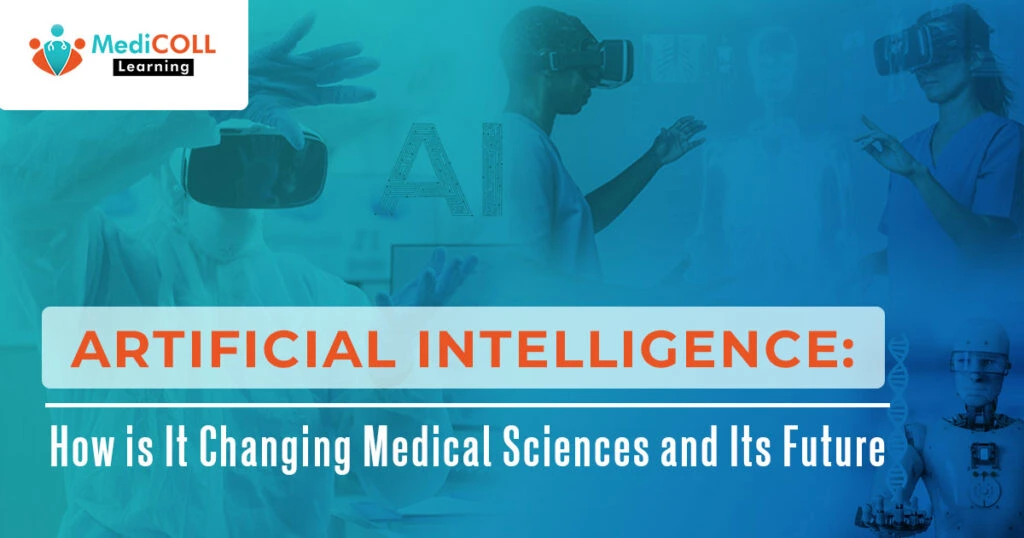
Artificial intelligence (AI) is poised to revolutionise healthcare and medicine. In recent years, the healthcare and medical industries have witnessed a remarkable transformation, driven in large part by the integration of artificial intelligence (AI) into their core operations. Artificial Intelligence, which was once a distant promise, is now at the forefront of innovations. The advancement of Artificial Intelligence is changing the approach to diagnosis, treatment, and patient care. It is also changing the way operational processes are optimised and improving the overall efficiency of healthcare systems.
The term "artificial intelligence" (AI) in healthcare refers to the use of machine-learning algorithms and software to simulate human cognition in the analysis, presentation, and understanding of complex medical and healthcare data. As well as go beyond human capabilities by offering novel approaches to disease diagnosis, treatment, or prevention.
The following sections explore the world of Artificial Intelligence in healthcare and how this latest technology is revolutionising the industry.
Here are six ways in which AI will have a significant impact on healthcare and medicine:
Disease Detection: AI-powered algorithms can analyse medical images — such as X-rays, MRIs, and CT scans — with high accuracy, aiding early detection and diagnosis of conditions like cancer, pneumonia, and diabetic retinopathy.
Drug Development: AI can significantly accelerate the drug discovery process by predicting potential drug candidates, simulating their effects, and identifying drug interactions, reducing research and development timelines.
Remote Monitoring: AI-driven wearable devices and sensors continuously monitor vital signs of patients and alert healthcare providers to any anomalies. This enables early intervention in case of health emergencies.
Health Assistants: Chatbots and virtual assistants can offer various functions like patient education, appointment scheduling, medication reminders, and symptom tracking. These functions enhance patient engagement and reduce administrative burdens on healthcare professionals. AI-powered robots can perform surgery with precision, assist in rehabilitation, and handle tasks such as medication delivery, as well as help with cleaning in healthcare facilities.
Radiology Assistance: Artificial Intelligence can assist radiologists in interpreting images and flagging potential abnormalities. This helps in reducing the workload of the radiologists and enhancing diagnostic accuracy.
Drug Adherence Monitoring: AI applications can track adherence of patients to medication regimens and provide reminders. This helps in improving patient compliance and treatment effectiveness.
Artificial intelligence (AI) is reshaping the healthcare and medical landscape, offering opportunities to enhance patient care, streamline operations, and improve overall outcomes. However, this transformation is not limited to technology. It also greatly affects the workforce and the very structure of healthcare organisations.
Gastroenterology: Artificial intelligence covers various uses in gastroenterology in several areas. Rapid identification of aberrant tissue is essential for endoscopic procedures such as colonoscopies and esophagogastroduodenoscopies (EGD). Artificial intelligence can improve endoscopic procedures, enabling gastroenterologists to diagnose gastrointestinal conditions, assess their severity, and identify blind spots swiftly as before.
Oncology: Artificial intelligence has recently been investigated for applications in molecular tumour characterisation, risk assessment, cancer diagnosis, and cancer therapy development. One of the specific problems in oncologic care is the ability to precisely forecast which treatment regimens will be most suited to each patient based on their unique inherited and tumour-based features. AI is being developed to solve this issue.
Radiology: In the discipline of radiology, artificial intelligence (AI) is being researched to identify and diagnose illnesses using magnetic resonance imaging (MRI) and computerised tomography (CT). The research might be beneficial in scenarios such as when the demand for human knowledge exceeds the supply or when the complexity of the data makes it difficult for human readers to understand.
Cardiovascular: Several investigations have directly evaluated the precision of machine learning models for clinician screening. However, artificial intelligence calculations have demonstrated promising results in accurately diagnosing and risk-stratifying patients with concerns about coronary artery disease. These results suggest potential as an initial triage tool.
AI's integration into healthcare and medicine is happening as we speak. The transformative potential of this technology promises more accurate diagnoses, personalised treatments, and improved patient outcomes.
MediCOLL Learning offers online fellowship programs through an e-learning platform. These programs help medical professionals enhance their clinical competence while also practising medicine. Since the fellowship is online, it provides flexibility and accessibility to continue the learning journey without interruption of work.
It is essential to do so with a commitment to the highest ethical standards, with the focus on benefiting patients and improving overall healthcare experience as we continue to explore and develop AI applications in healthcare. The future of healthcare and medicine is fueled by Artificial intelligence.
© Copyrights Medicoll All rights reserved.